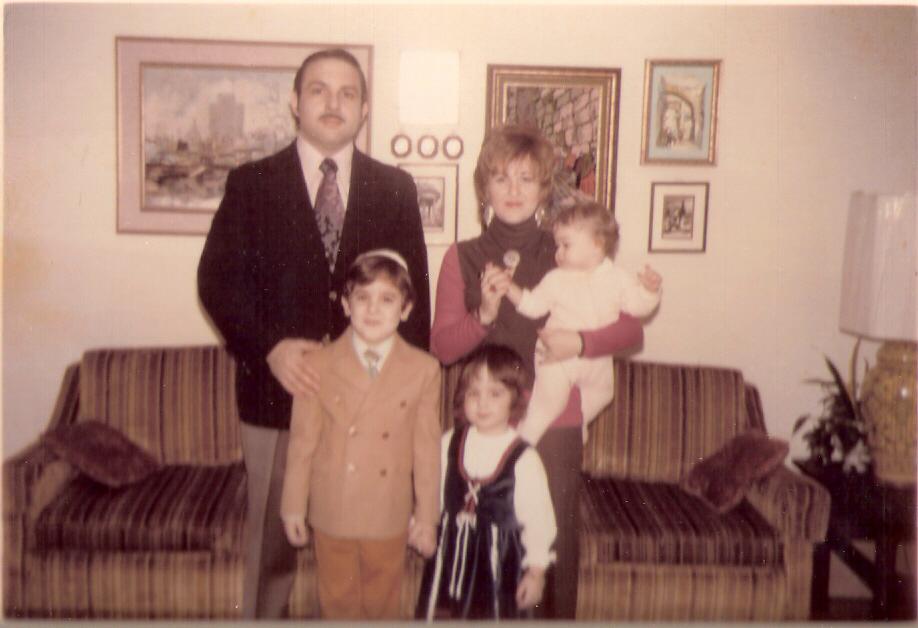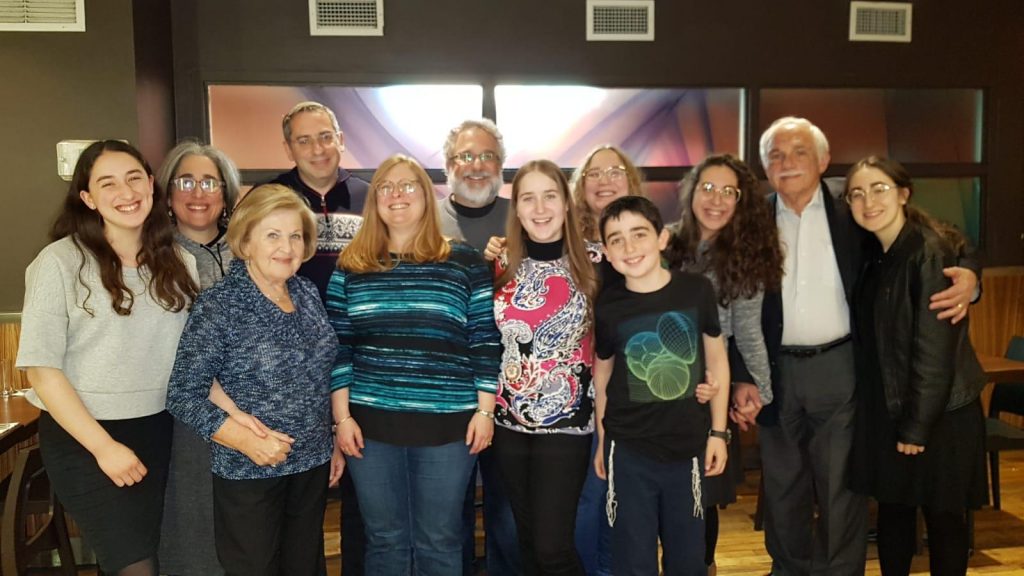Bubby's Life And Life Lessons


My name is Monica Weisz Gauze. I was born on April 18, 1942 in the small town of Humenne, Czechoslovakia. My Hebrew name is Miriam Hensha. This is my story of how I survived the Holocaust, how I built a new life in Canada with my family, and some useful life lessons for my grandson.
When I was growing up, I spoke Slovak at home. My parents spoke
Hungarian to each other and to their friends, so I learned that too. When I was a bit older (after I was married) I learned Yiddish, because my husband’s family spoke Yiddish.
Before the war started, I lived with my mother, my father, and my younger sister Dagmar. I had six aunts and uncles, as well as grandparents on my father's side. I had four aunts and uncles and grandparents on my mother's side.
MY LIFE DURING THE WAR
I was a baby during the Holocaust. I was born after the war started. I was four years old when it ended in 1945. I do not really have any memories from then. My first memories started from the age of five or six.
One of my first memories is being with my cousins the Spira family, when the Russians came into Czechoslovakia to chase out the Germans at the end of World War II. There was a bombing raid. Our windows were covered with dark fabric so that airplanes would not see the light. My cousin had whooping cough and I remember being very worried that the Germans or the Russians would hear her coughing and would bomb us. This worry might sound funny, but you try to live in a house where there's a war plane right outside. It's hard, eh?
During the Holocaust I hid with my sister and my parents in the forest.
After a while, we got papers that said we were Christian. I was blonde and blue-eyed and the Germans thought that this was what a perfect German girl looked like. We pretended we were non-Jews and my mother wore a necklace with a cross on it. We even went to church. We went from town to town with my mother, finding places to live. My mother told people that our father was in the army to explain why he wasn’t with us.
Really, my father was with the Partisans in the forest. He was fighting the Germans.
Every Sunday, my father would come out of the forest into town and would walk right by our house. My mother brought me and my sister to the window to see him walking by, and so he could see us. We did this so that we each knew that the other one was alive. My father didn’t even make eye contact with us through the window, because he didn’t want people to think that he knew us.
During the war, everyone in the family made a promise to each other. Everyone promised that whoever would survive the war would come back home to Hummene to find each other. Family was everything to us. That is what everyone did. After the war everyone in our family who was still alive came back to the town to reunite.
By the time the war ended, all my grandparents had been killed in Auschwitz, as well as three of my aunts and uncles.
We stayed in Hummene from 1945 until 1949.
I remember that when I was six, after the war, I had a friend named Eva and a friend named Tommy. After the war, I also had a new baby brother named George, and a new baby cousin named Hedda who was born.
IMMIGRATION TO CANADA
On May 11, 1949 my family immigrated to Montreal, Canada.
My parents chose to live in Canada. We were originally supposed to go to Israel. My father was very involved in the Beitar movement in Czechoslovakia. One year, when he was young, he was Jabotinsky’s helper when Jabotinsky came to tour Europe to speak to the Jews about building a Jewish state. My father accompanied Jabotinski from town to town. After the Holocaust, my father also helped smuggle guns from Czechoslovakia to Palestine. He wanted to help the people in Israel who were creating the Jewish state.
After the war, my parents received papers to immigrate to Canada before they received papers to live in Israel. So they came to Canada. My father had to leave Czechoslovakia in a hurry because the Czech police realized that he was helping to smuggle guns to Israel. My mother wanted to live a peaceful life with her siblings in Canada. Her brother John lived in Montreal at the time. My father’s siblings went to Israel. They came to visit me years later at my wedding.
We travelled from Europe to Canada by ship. First, we went by train from Czechoslovakia to Holland, then from Holland to England. In Southampton, England we boarded the ship .The name of the ship was “the Aquitania”. That ship had been built in the early 1900s. It was a luxury ship, but during World War I and World War II it had been used as a hospital ship. By the time we travelled to Canada, it had been turned into a luxury ship again. I do not remember my time on the ship. I think it took six or seven days. My only memory is that my younger sister threw down a blue-eyed baby doll that I had from her top bunk on the ship. She was jealous that her doll had brown eyes. I remember my doll was broken and I was upset.
My first memory of Canada was of getting off the boat in Halifax, Nova Scotia. We spent Shabbat in a barracks. Then we took a train to Montreal. For the first time in my life I saw an escalator. At the bottom of the escalator my Uncle John was waiting for us. I remembered him from Czechoslovakia.
After I came to Canada, I started grade one in a Catholic school in Montreal. We were excused from Christian prayers. We knew we were Jewish. I loved school.
At first we lived on a street called Park Avenue. My mother opened a hat salon in the front parlour of our house. One of the bedrooms was her work room. We lived behind the store for five years. Then we moved to our second house, on Stuart Avenue. This house was across the street from my school. When I first came to Canada I repeated grade one for half a year so that I could learn English. I learned English quickly. Then in January, I went to grade two. I remember that I was ahead of other kids in math. I walked with my sister to school every day and after school we went to Jewish afternoon school. We learned Hebrew and Yiddish. We had lots of friends.
LIVING IN CANADA
I tried different hobbies. I took piano lessons, but I did not like it because I had short fingers. I tried all the sports at school, but I was not the most athletic. What I really loved to do is write for the school newspaper. I was also editor of the yearbook and a member of the glee club. I rode bikes on the street with my friends. I had a nice and happy childhood in Canada. I worked very hard in school. After four or five years I stopped going to afternoon Hebrew school. I was not learning much there. Then I had private Hebrew lessons. I am sorry I stopped afternoon school. I’m also sorry I stopped piano lessons. I am missing those in my life now.
In the summers, I stayed home some years. I went to the Y day camp. When I was 12 years old my parents sent me to a sleep-away camp. During the second summer, I went to a JCC camp for three weeks, and I did that for two years. In the third year, I went to a girls-only camp. I hated it (there were no boys). When I was 13, I went to Camp Massad. This was the only Hebrew- speaking camp in the Laurentian mountains. They were very serious that we had to speak Hebrew in camp. I missed out because I did not know a lot of Hebrew from afternoon school. So I did not enjoy it very much and I never went back. Then I was a counsellor at different sleep-away camps. I want to give you some advice. Don’t give up on things so easily. I wish I had learned more Hebrew when I was younger. I also wish I’d stayed at Camp Massad.
I met my husband, Dr. Joseph Gauze, who is now an eye, nose and mouth doctor, at the Student Zionist Organization at McGill University in Montreal. They had dances and evenings about current events. We noticed each other in the smoking room of the library. He banged his pipe on my head by mistake, and that is how we met.
At university I studied sociology. I wanted to be a social worker or a psychologist.
I did not go back to Czechoslovakia for many years, until I returned on a roots trip with my children. That was 16 1/2 years ago. It was the first time I was back. I did not have big feelings about it. I wanted to go to the graves of my relatives and to pay my respects to the family that had died in the Holocaust. My parents did not talk about the war when we came to Canada. It was too hard for them to talk about. They did talk about it with my children, though, years later. My kids talked with my parents a lot about their life and their experiences in Europe and then in Canada.
BUBBY'S LIFE LESSONS
Here are some big life lessons and advice for life for you: Put one foot in front of the other. When things look really bad, have the courage to continue. Continue and be hopeful that things will turn out. Even when bad things happen to you, there are always good things too. You have to move on. Life can have good things and bad things. You have to laugh. You have to find the funny things in life, tell jokes, and not take yourself too seriously. Even when things are not good, find something funny in the situation. I am grateful for my wonderful family and I love my grandchildren. I feel very lucky. I AM lucky. I am grateful that I'm a Holocaust survivor, that I survived, and I am grateful to my mother for being a strong, courageous lady. Today I am a Bubby and I am now spending time vacationing in Florida in a retirement community. I do not know what I’m doing here! I’m too young to be here! I should be roller skating. I am grateful that we are healthy and that we get to face-time with our grandchildren. What a blessing and joy that I can talk to them. Today I am grateful for everything.
הזוית האישית
הסיפור תועד במסגרת מפגשי תכנית "הקשר הרב דורי" בבית הספר.
מילון
BubbieA grandmother
ציטוטים
”!I am grateful for everything. I should be rollerskating “





